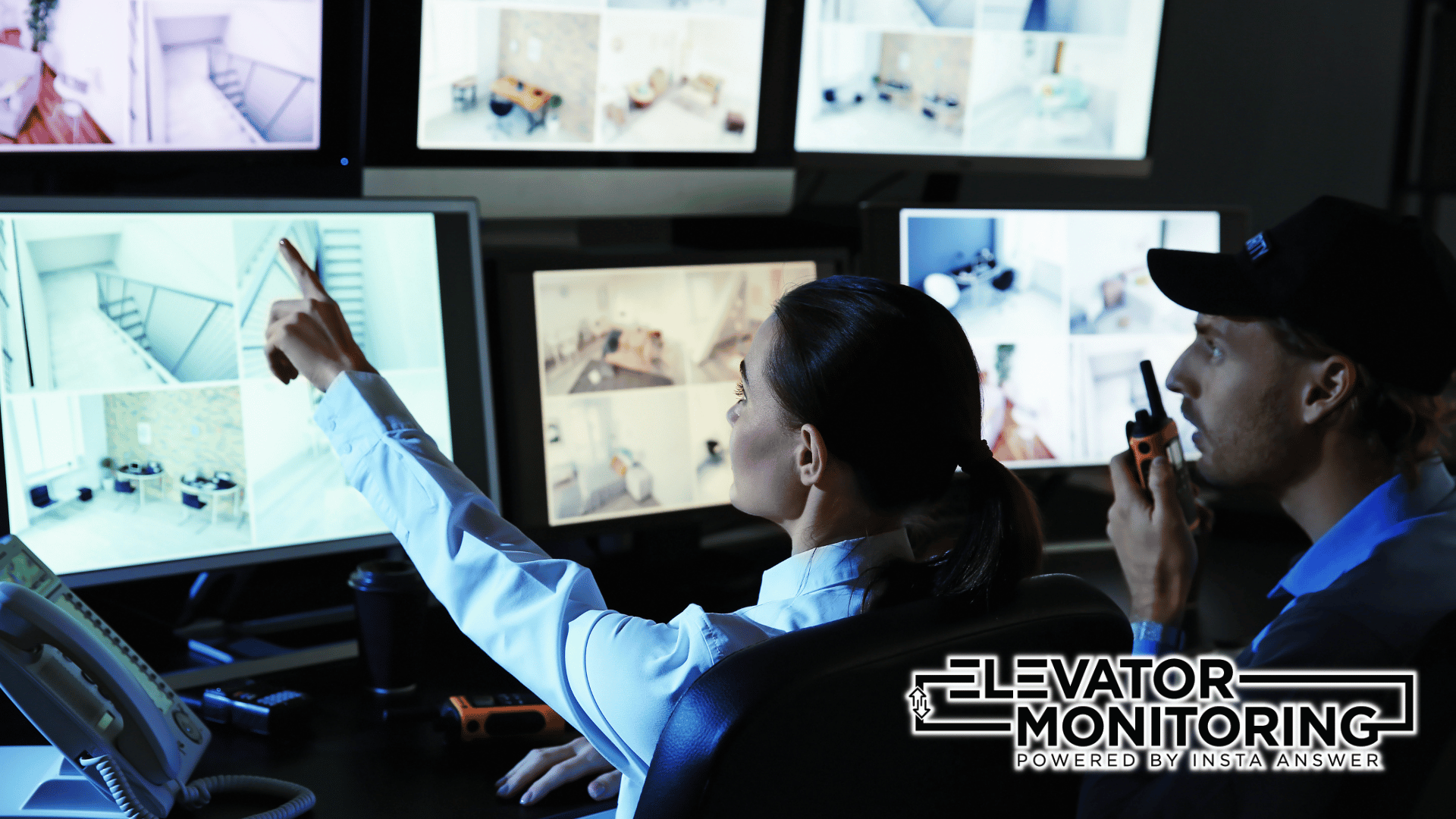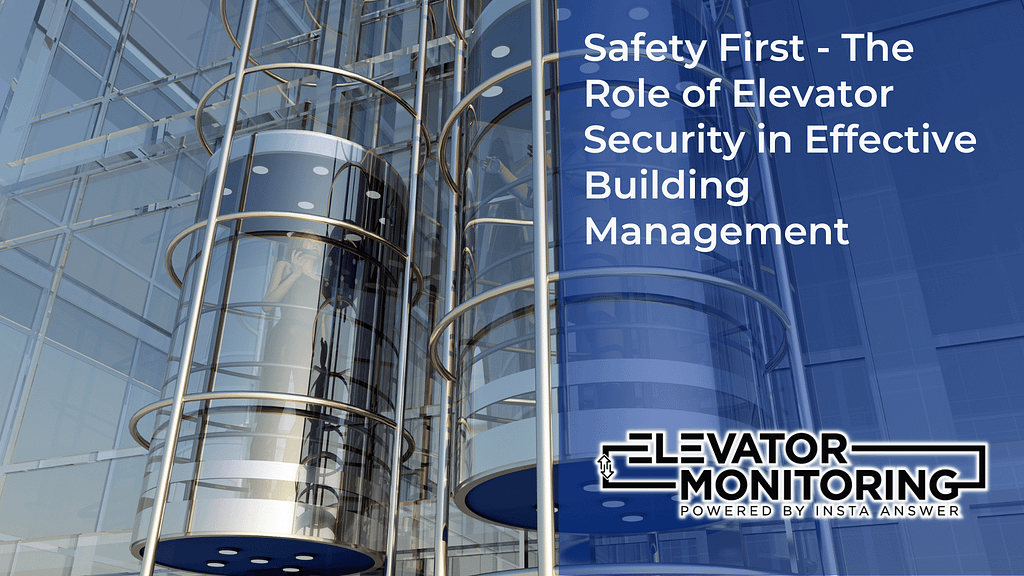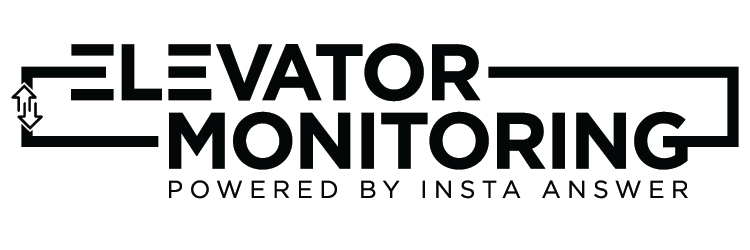Safety First – The Role of Elevator Security in Effective Building Management
Rather listen to the BlogCast for this post instead? Click the “Play” button below to hear it now.
Introduction
Ensuring elevator security is vital for managing modern buildings and maintaining safety in high-rise spaces. This concept encompasses a range of measures designed to protect individuals and property within these vertical transportation systems, which is vital to the daily operations of countless buildings worldwide. Elevator security is not just a matter of compliance; it’s a cornerstone of modern urban infrastructure that significantly contributes to the wellbeing of building occupants.
Furthermore, in an era of rising urban population density, it is crucial to prioritize secure and dependable elevator systems.
However, the primary aim of this article is to explore the many advantages of elevator security, emphasizing technological advancements and providing practical tips. We will explore how elevator security measures not only enhance safety but also improve overall building operations, tenant satisfaction, and management efficiency.
Understanding Elevator Security
Elevator security focuses on strategies and technologies for safe and efficient elevator operation. Historically, mechanical safety was the primary concern, but elevator security has evolved to include electronic surveillance, access control, and emergency communication systems. This evolution signifies the increasing importance of comprehensive security measures in ensuring the safety and reliability of elevator systems.
However, elevator security is not just about preventing accidents; it also plays an important role in the broader context of building safety, influencing everything from daily operations to emergency response protocols.
Besides mechanical and electronic safeguards, modern elevator security requires regular risk assessments and adherence to developing safety standards. This includes everything from the design and installation of the elevators to their day-to-day operation and maintenance.
The integration of these measures is crucial for overall building safety, preventing accidents, deterring crime, and responding to emergencies quickly. The complexity of these systems highlights the need for specialized knowledge and continuous management to ensure they remain effective and responsive to the needs of building occupants.
Benefits of Elevator Security
The main advantage of efficient elevator security is that it improves safety. Elevator and escalator incidents in the United States lead to approximately 30 deaths and 17,000 serious injuries annually, with elevators being the primary cause of these accidents and fatalities. This statistic, provided by the U.S. Bureau of Labor Statistics, highlights the significant safety risks associated with elevator use, especially considering that about half of these deaths involve workers engaged in elevator or escalator-related tasks. Implementing advanced security measures can significantly reduce these incidents.
Also, strong security measures play a central role in deterring crime. Buildings with effective elevator security, especially those with video monitoring, report lower incidences of vandalism and other criminal activities, which contribute to a safer environment for residents and workers.
In times of emergency, secure and well-monitored elevators are invaluable. They not only make evacuations faster but also help first responders reach affected floors swiftly. Additionally, robust security measures in elevators increase tenant confidence.
Residents and users of buildings equipped with secure elevator systems have higher levels of satisfaction and trust, which is essential for maintaining a positive property management reputation. Trust is essential in a world where tenant safety concerns are increasingly important, making elevator security a vital component of building management.

The Impact of Audio and Video Monitoring on Elevator Security
The integration of audio and video monitoring technologies has revolutionized building security. Real-time elevator surveillance improves safety by allowing quick responses to incidents such as mechanical failures, medical emergencies, or security breaches.
However, this instant monitoring capability is not just about crisis management; it also aids in the regular maintenance and operational efficiency of elevator systems. By identifying elevator issues promptly, these technologies can prevent minor problems from escalating into major disruptions.
Another element of this technology involves gathering and analyzing data. By examining audio and video recordings, building managers can gather insights on usage patterns, uncover security risks, and make informed choices regarding maintenance and upgrades. Implementing these technologies, though, requires a careful balance between enhanced security and privacy concerns.
Remember, respecting tenants’ privacy while ensuring their safety is a delicate yet crucial aspect of installing and managing audio and video monitoring systems in elevators. As such, it’s important for building managers to communicate clearly with tenants about the purpose and scope of these security measures.
Tips and Best Practices in Elevator Security
Regular maintenance is key to ensuring effective elevator security. To prevent accidents and maintain system reliability, it’s important to schedule routine checks and promptly address any issues. Remaining current with technological advancements is another critical element. By updating systems to include the latest features in security technology, building managers can enhance safety and efficiency significantly.
Additionally, it’s important for maintenance teams to stay up to date with the latest safety regulations and best practices in elevator security to ensure ongoing compliance and effectiveness.
Training staff is equally important; personnel responsible for building management should be well-versed in the latest elevator security protocols and technologies. This includes not only training technical staff but also security personnel and management teams who must understand the nuances of elevator security to respond effectively to incidents.
Finally, adherence to safety regulations is non-negotiable. Building managers must ensure that their elevator security systems comply with local, national, and international safety standards to avoid legal complications and ensure the safety of tenants and users. Commitment to regulatory compliance not only enhances safety but also reinforces the building’s reputation for responsible management.
The Future of Elevator Security
As we look to the future, emerging technologies and trends will transform the field of elevator security. Innovations such as AI-integrated monitoring systems, advanced biometric access controls, and IoT-enabled predictive maintenance are already becoming popular. These types of advancements promise not only to enhance security but also to improve the overall user experience and operational efficiency of elevators.
Staying abreast of new elevator security developments is crucial for building managers who aim to provide building tenants and users with state-of-the-art facilities.
Anticipating and preparing for these changes is crucial for building managers looking to stay ahead of the competition in property management. The future will certainly bring new challenges, but with these will also come opportunities for significant advancements in the safety and efficiency of elevator systems.
By embracing emerging technologies and adapting to developing safety standards, building owners and managers can ensure that their properties are always safe and efficient, offering peace of mind to tenants and visitors alike.
Conclusion
In summary, elevator security is a crucial aspect of building management, ensuring tenant safety and satisfaction. From the historical evolution of elevator safety measures to the modern integration of advanced technologies, it’s clear that effective elevator security is paramount. This article underscores the importance of elevator security in building management, while highlighting its benefits, best practices, and future trends.
Furthermore, implementing and maintaining robust elevator security systems should be a top priority for building managers committed to providing safe and efficient environments for their occupants.

Summary
The article thoroughly examines securing elevators and their surrounding areas, a crucial aspect of contemporary building management. The article focused on elevator security, exploring its evolution, current status, and the various benefits it offers: enhanced safety, crime deterrence, improved emergency response, and increased tenant confidence.
Additionally, we discussed the importance of audio and video monitoring technologies and their role in advancing building security, along with the need for regular maintenance, staff training, and adherence to safety regulations. Looking ahead, the article covered the promising future of elevator security with emerging technologies. The overall message is clear: effective elevator security is a must for safe and efficient building management, and staying updated with the latest developments in this field helps managers and security teams accomplish this.
ElevatorMonitoring.net: Your Partner for Better Building Security
For building managers and property owners seeking to enhance their building security, the journey towards safer, more efficient buildings starts with informed decisions and the adoption of advanced technologies.
ElevatorMonitoring.net offers specialized services in elevator audio and video monitoring, as well as elevator answering and dispatching services. With over 50 years of experience in the elevator industry, we provide the tools and expertise needed to elevate your building’s security to the next level.
If you would like to learn more about how ElevatorMonitoring.net can help improve your building’s safety and streamline costs and operations, contact us today for a no-cost, no-obligation consultation, and start on the road to stay ahead in the rapidly evolving field of building management. You can reach us by phone toll free at 1-877-631-9711 or by email at [email protected]. We look forward to hearing from you soon.










